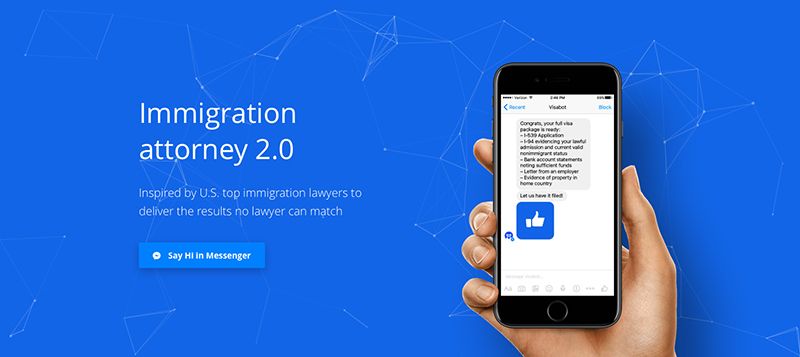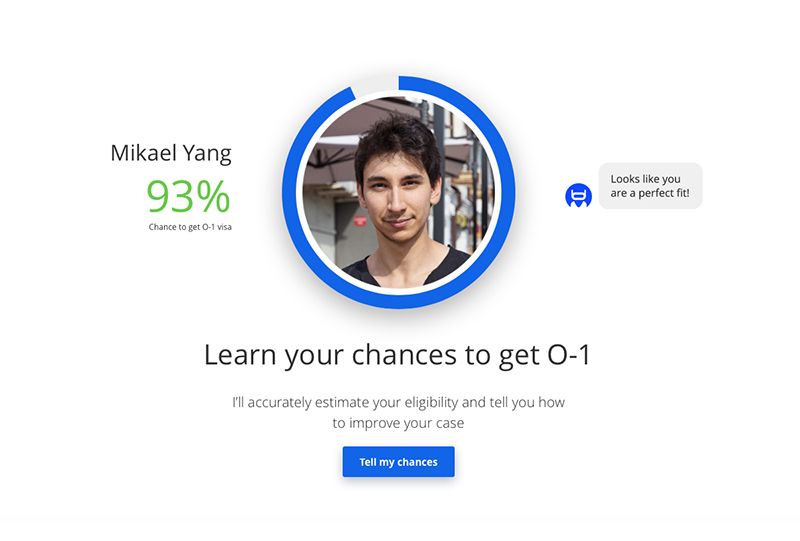Could This Chatbot Prevent Some Deportations?
Visabot helps immigrants and visitors to the United States obtain and keep visas
/https://tf-cmsv2-smithsonianmag-media.s3.amazonaws.com/filer/33/76/3376f2e9-e719-47c6-b074-e11effa2aa6a/visa.jpg)
For those holding visas allowing them temporary residency in the United States, forgetting to file a piece of paperwork or missing a hearing can result in detention or even deportation. Recent actions by the Trump administration have made this prospect even more real and frightening for the country’s more than 40 million immigrants.
Now, two Russian expatriates, who have studied law and been through the arduous and expensive visa process themselves, have decided to make it easier for their fellows. They’ve launched Visabot, a free AI chatbot aimed at guiding immigrants and visitors through the steps of visa procurement and renewal, potentially helping them avoid deportation.
“Originally we started it when we discovered we needed visas to be here,” explains Artem Goldman, Visabot’s CEO. “The original bot was for us, to help us build the documents. Then we decided we could help more people.”
Immigration attorneys are expensive, and waiting for appointments can take weeks or months. But around 80 percent of the visa process can be automated, says Goldman.
Immigration attorneys ask very standard questions, explains Andrey Zinoviev, Visabot’s managing partner..
“Even though they all tell their clients that this particular client or situation is unique, the truth is, it’s not unique,” he says. “There are 10 or 15 patterns they all follow.”

Visabot’s algorithm follows these patterns to guide users through the process of filing the necessary paperwork. As of now, it can accomodate those applying for certain nonimmigrant visas, meaning visas issued to people with permanent residence outside the U.S. who wish to be in the U.S. on a temporary basis. The visa types it covers include the O-1, meant for people with “extraordinary ability” in science, art, education, business, athletics or entertainment, and an extension of the B-2, a visa for people entering the U.S. for family visits, recreation or medical care. Most of its users are people who are already inside the United States. Using Visabot is meant to be simple enough for any person to do it, no expertise necessary.
“You basically go to Facebook messenger, and you’re just chatting,” Goldman says. “It’s asking and answering, getting you to get all the documents, forms and cover letters, [telling you] what to do next. It’s super-easy—it takes 15 minutes.”
Visabot tells users what paperwork they need to complete and helps them fill it out, gives templates for letters of recommendation and other forms, and estimates their chances of obtaining the visa.

Recently Visabot began offering help to immigrants eligible for the Deferred Action for Childhood Arrivals (DACA) policy. The policy allows certain people who were brought to the U.S. as children to receive a deferred deportation and get a work permit or continue their studies. These people, sometimes referred to as “dreamers,” are subject to specific eligibility criteria.
“A lot of people don’t know if they’re eligible for DACA or not, and our bot can help tell you if you’re eligible and you can do it,” Goldman says.
Many DACA eligible immigrants come from poor families, Zinoviev explains, and believe that, even if they’re eligible, it will be too expensive or difficult to complete the process.
“What we want to do is take any friction out of the process and show them that, ‘hey, guys, it’s super-easy,’” he says.
For the thousands of dreamers in the United States—one of whom was detained by immigration officials after speaking to the press about immigrants’ rights last week, despite having a DACA application in process—this will likely be welcome news. Visabot worked with the Stanford Center for Legal Informatics to create the DACA portion of the chatbot, consulting a variety of legal experts.
So far Visabot has served about 50,000 clients. In its first week week in February, the DACA portion had served about 1,000. The bot will always be free for individuals, its founders say, but they’re working on creating a paid bot for use by nonprofits and institutions, including universities. They also hope to increase the types of visas Visabot covers. Right now, they are looking into the L-1A visa for intracompany transferees in managerial and executive positions, the J-1 to B-2 for students and temporary employees who want to continue to stay in the U.S. as tourists, and the extension of B-1 temporary business visas.
More than 10 million people enter the U.S. on visas every year. “This is the size of the impact we want to make,” Zinoviev says.
/https://tf-cmsv2-smithsonianmag-media.s3.amazonaws.com/accounts/headshot/matchar.png)
/https://tf-cmsv2-smithsonianmag-media.s3.amazonaws.com/accounts/headshot/matchar.png)